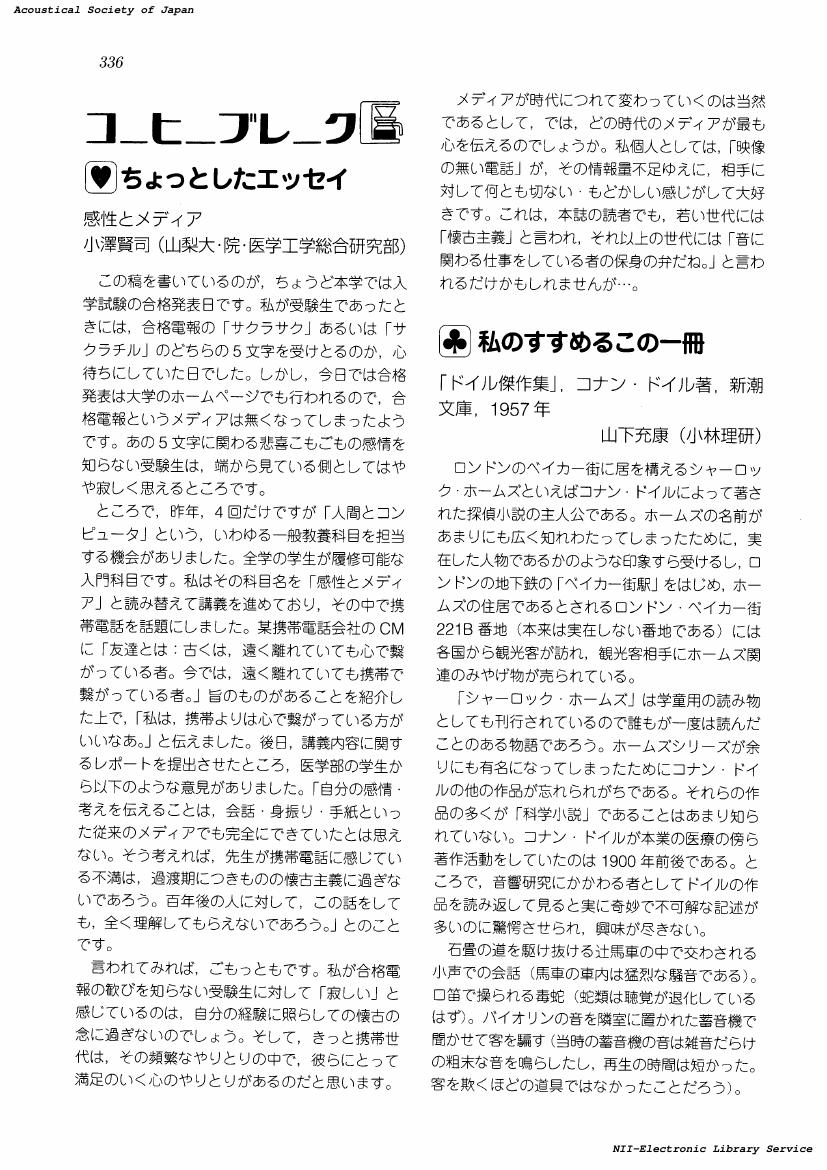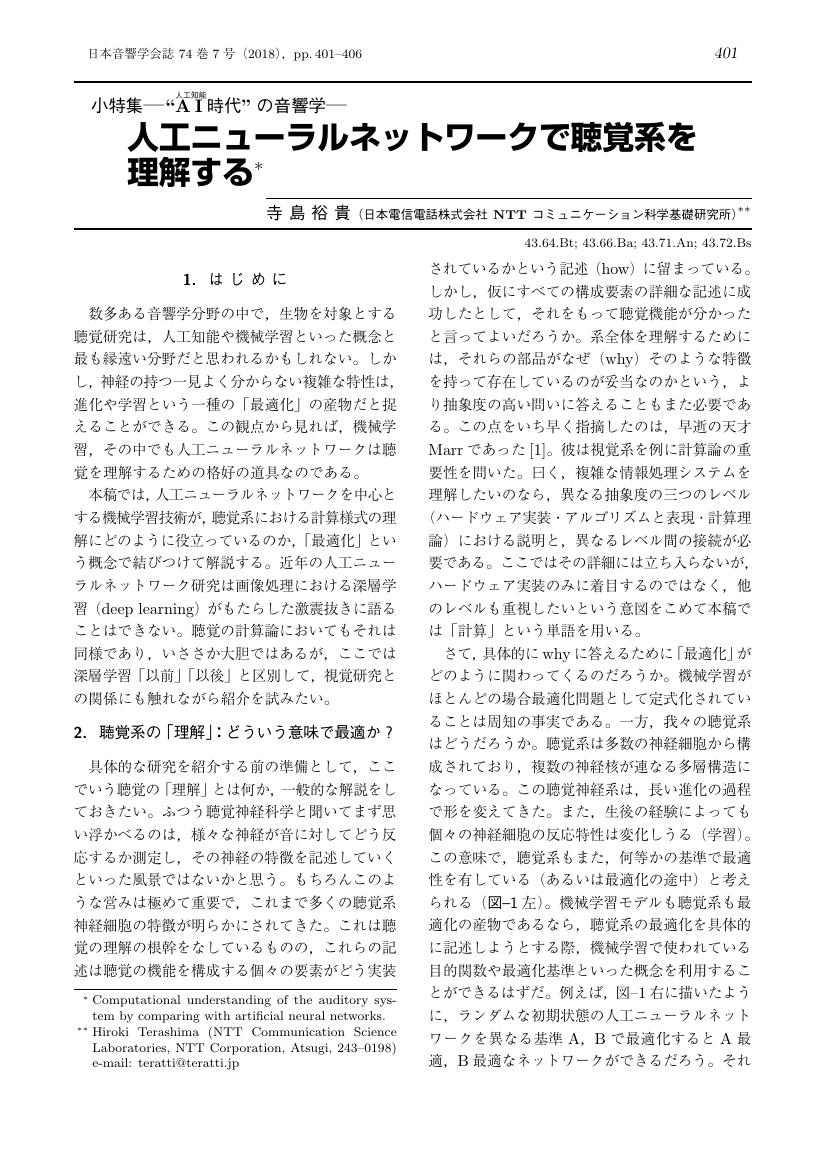2 0 0 0 OA 音響指紋技術とその応用
- 著者
- 柏野 邦夫
- 出版者
- 一般社団法人 日本音響学会
- 雑誌
- 日本音響学会誌 (ISSN:03694232)
- 巻号頁・発行日
- vol.66, no.2, pp.71-76, 2010-02-01 (Released:2017-06-02)
- 参考文献数
- 27
- 被引用文献数
- 2
2 0 0 0 OA 音場におけるグリーン関数と積分方程式
- 著者
- 大谷 真
- 出版者
- 一般社団法人 日本音響学会
- 雑誌
- 日本音響学会誌 (ISSN:03694232)
- 巻号頁・発行日
- vol.76, no.3, pp.180-187, 2020-03-01 (Released:2020-09-01)
- 参考文献数
- 15
2 0 0 0 OA 円板録音および再生技術の諸問題
- 出版者
- 一般社団法人 日本音響学会
- 雑誌
- 日本音響学会誌 (ISSN:03694232)
- 巻号頁・発行日
- vol.25, no.3, pp.153-161, 1969-05-30 (Released:2017-06-02)
2 0 0 0 OA 複共振系によるレコードピックアップの高音共振の制動
- 著者
- 山本 武夫 似鳥 高司
- 出版者
- 一般社団法人 日本音響学会
- 雑誌
- 日本音響学会誌 (ISSN:03694232)
- 巻号頁・発行日
- vol.27, no.11, pp.551-558, 1971-11-10 (Released:2017-06-02)
A minimized mechanical impedance is desirable in order that a phonograph pickup can trace a sound groove correctly. Current phonograph pickups, however, have resonance peaks in their frequency responses and mechanical impedance characteristics in the neighborhoods of their high frequency ends. This has introduced a great problem to sound groove tracing. Current pickups have high resonance frequencies beyond the hearing limit rather than damped resonances which can be achieved by lowering the equivalent mass of the vibrating system as shown in Fig. 2. But this method gives some problems such as degradations of sensitivities and fragilities. In this paper, as an effective method for damping out the high frequency resonance, a vibrating system with two degrees of freedom has been studied. As a result of the analysis, it has been made clear that the following method is useful. That is splitting the cantilever into two parts and connecting them with elastic material with small resistance, and damping the high frequency resonance by the resistance of the armature bearing. The split cantilever makes not only the high frequency flat but also the mechanical impedance characteristic in the high frequency range flat, as shown in Fig. 6, therefore the split cantilever is suitable for a high quality phonograph pickup. Experimental phonograph cartridges with split cantilevers (Fig. 7) have been made. Fig. 8, shows the frequency response and the mechanical impedance characteristic of the experimental cartridge. It's results agree well with the calculated results shown in Fig. 9.
2 0 0 0 OA レコードピックアップの針とび現象
- 著者
- 山本 武夫
- 出版者
- 一般社団法人 日本音響学会
- 雑誌
- 日本音響学会誌 (ISSN:03694232)
- 巻号頁・発行日
- vol.28, no.12, pp.688-693, 1972-12-01 (Released:2017-06-02)
- 著者
- 山下 充康
- 出版者
- 一般社団法人 日本音響学会
- 雑誌
- 日本音響学会誌 (ISSN:03694232)
- 巻号頁・発行日
- vol.60, no.6, pp.336-337, 2004-06-01 (Released:2017-06-02)
2 0 0 0 OA 救急車の警告音の検知に関する研究
- 著者
- 馬場 紘彦 江端 正直
- 出版者
- 一般社団法人 日本音響学会
- 雑誌
- 日本音響学会誌 (ISSN:03694232)
- 巻号頁・発行日
- vol.52, no.4, pp.244-252, 1996-04-01 (Released:2017-06-02)
- 被引用文献数
- 1
本論文は, 一般ドライバの音環境(L_<Aeq>)を調べ, 電子サイレン音の検知レベルを測定し, 運転に向ける注意の効果や, 救急車の接近を予測していないこと等の要因に依る検知レベルの上昇を実験的に求め, 更に救急車の電子サイレン音に気づく距離を推測したものである。得られた結果は以下のとおりである。(1)運転中に聴く音楽のL_<Aeq>の平均値は67.0dBであり, L_<Aeq>が2dB大きくなるごとに約1.0〜1.7dB聞こえ難くなる。(2)車速が10km/h増すごとに, 約0.5dB検知レベルは上昇する。(3)予期時と非予期時との検知率の差は音圧レベルに依り異なる。そして, 検知率が50%付近では, 非予期時の場合は予期時の場合よりいき値が約6dB上昇する。これらのことから, 検知率は救急車の距離が10m遠くなるごとに計算上約13%減少する.
2 0 0 0 OA 常微分方程式に対する構造保存数値解法
- 著者
- 剱持 智哉
- 出版者
- 一般社団法人 日本音響学会
- 雑誌
- 日本音響学会誌 (ISSN:03694232)
- 巻号頁・発行日
- vol.78, no.10, pp.586-593, 2022-10-01 (Released:2022-11-01)
- 参考文献数
- 21
2 0 0 0 OA 機構設計によるカメラシャッタ作動音の音質改善
- 著者
- 戸井 武司 風早 聡志
- 出版者
- 一般社団法人 日本音響学会
- 雑誌
- 日本音響学会誌 (ISSN:03694232)
- 巻号頁・発行日
- vol.58, no.7, pp.406-413, 2002-07-01 (Released:2017-06-02)
- 参考文献数
- 11
カメラシャッタ音のように,静音化だけではなく,個人的な嗜好を満足させる快音化の音作りが必要となっている。本研究では,まずシャッタ音のような非定常音に対する音質評価を行い,作動音で寄与が大きい部分を把握する。次に,寄与が大きいミラーバウンド音をフィルタリングし,心地良いシャッタ音を決定する。一方,簡単な薄板実験モデルを用いて,動作機構は現状のままで衝撃位置のみ変更することで,バウンド音が改善することを確認する。更に,構造有限要素モデルを用いて,各衝撃位置で発生する衝撃力を求め,薄板の振動速度を算出し,バウンド音を予測する。これより,心地よいバウンド音を発生させるための衝撃位置が推定できた。
2 0 0 0 OA コーヒーブレーク
- 出版者
- 一般社団法人 日本音響学会
- 雑誌
- 日本音響学会誌 (ISSN:03694232)
- 巻号頁・発行日
- vol.74, no.7, pp.413-414, 2018-07-01 (Released:2019-01-01)
2 0 0 0 OA パラメトリックアレイとその特徴
- 著者
- 鎌倉 友男 酒井 新一 野村 英之
- 出版者
- 一般社団法人 日本音響学会
- 雑誌
- 日本音響学会誌 (ISSN:03694232)
- 巻号頁・発行日
- vol.74, no.6, pp.345-352, 2018-06-01 (Released:2018-12-01)
- 参考文献数
- 14
2 0 0 0 OA 人工ニューラルネットワークで聴覚系を理解する
- 著者
- 寺島 裕貴
- 出版者
- 一般社団法人 日本音響学会
- 雑誌
- 日本音響学会誌 (ISSN:03694232)
- 巻号頁・発行日
- vol.74, no.7, pp.401-406, 2018-07-01 (Released:2019-01-01)
- 参考文献数
- 31
2 0 0 0 OA End-to-End音声処理の概要とESPnet2を用いたその実践
- 著者
- 林 知樹
- 出版者
- 一般社団法人 日本音響学会
- 雑誌
- 日本音響学会誌 (ISSN:03694232)
- 巻号頁・発行日
- vol.76, no.12, pp.720-729, 2020-12-01 (Released:2021-03-10)
- 参考文献数
- 72
2 0 0 0 OA 長い円筒音場で発生するスイープエコーについて
- 著者
- 金田 豊 古家 賢一 清原 健司
- 出版者
- 一般社団法人 日本音響学会
- 雑誌
- 日本音響学会誌 (ISSN:03694232)
- 巻号頁・発行日
- vol.67, no.12, pp.574-575, 2011-12-01 (Released:2017-06-02)
- 参考文献数
- 4
2 0 0 0 OA 日本語を歌・唄・謡う
- 著者
- 中山 一郎
- 出版者
- 一般社団法人 日本音響学会
- 雑誌
- 日本音響学会誌 (ISSN:03694232)
- 巻号頁・発行日
- vol.59, no.11, pp.688-693, 2003-11-01 (Released:2017-06-02)
- 被引用文献数
- 2
2 0 0 0 OA 音響計測とキャリブレーション
- 著者
- 森川 昌登
- 出版者
- 一般社団法人 日本音響学会
- 雑誌
- 日本音響学会誌 (ISSN:03694232)
- 巻号頁・発行日
- vol.76, no.6, pp.351-356, 2020-06-01 (Released:2020-12-01)
- 参考文献数
- 9
2 0 0 0 OA 教育施設から発生する音
- 著者
- 西川 嘉雄
- 出版者
- 一般社団法人 日本音響学会
- 雑誌
- 日本音響学会誌 (ISSN:03694232)
- 巻号頁・発行日
- vol.76, no.8, pp.444-449, 2020-08-01 (Released:2021-02-01)
- 参考文献数
- 12
- 著者
- 木谷 俊介 宮内 良太 鵜木 祐史
- 出版者
- 一般社団法人 日本音響学会
- 雑誌
- 日本音響学会誌 (ISSN:03694232)
- 巻号頁・発行日
- vol.68, no.11, pp.546-556, 2012-11-01 (Released:2017-06-02)
- 参考文献数
- 23
ヒトは,様々な音の中から目的音を聴取する際に,手がかり音をあらかじめ聞いておくことで,目的音をより容易に検知できる。本論文では,手がかり音によって,聴覚末梢系における周波数分析特性が変化し,それによって目的音検知が容易になる可能性について検討する。まず,ノッチ雑音同時マスキング実験を行い,手がかり音を事前に呈示する条件と呈示しない条件のマスキング閾値を測定した。次に,得られたノッチ雑音マスキングデータから手がかり音呈示の有無の条件ごとに聴覚フィルタ形状を推定した。最後に,推定された聴覚フィルタの同調特性としてフィルタのQ値(先鋭度)を求めた。その結果,手がかり音を呈示しない条件に比べ,手がかり音を呈示した条件では聴覚フィルタのQ値が大きくなった。これは,フィルタの先端部が鋭くなったことを表しており,末梢系の周波数分析特性が手がかり音によって変化したことを示唆している。
2 0 0 0 OA 声帯音源の自励振動モデル
- 著者
- 石坂 謙三 フラナガン ジェームズ L.
- 出版者
- 一般社団法人 日本音響学会
- 雑誌
- 日本音響学会誌 (ISSN:03694232)
- 巻号頁・発行日
- vol.34, no.3, pp.122-131, 1978-03-01 (Released:2017-06-02)
- 被引用文献数
- 4
In earlier work, we derived a dynamic model of vocal-cord vibration, in which a single vocal-cord is described by two mechanical resonators coupled with a stiffness, so-called a two-mass model of the vocal-cords. This simplified model reveals essential features of the self-exciting oscillation mechanism of vocal cord vibration and duplicates the principal features of vocal cord behavior in the human. In the original two-mass model, we estimated that the longitudinal component of vocal cord motion has only secondary influence upon glottal flow and hence upon the self-exciting oscillation mechanism. Therefore, the longitudinal motion has been neglected. We examined the more rigorously earlier estimate. We modifyied the two-mass model for on additional longitudinal motion parallel to the direction of glottal flow. The formulation also involves the rate of air volume displaced by the vibrating masses. Then, computer simulation was carried out on the dynamic twodimensional motion for the vocal cord masses, as shown in Fig. 5. This motion corresponds with the observation made on natural larynxes. According to the results, the longitudinal component of displacement influences oscillation frequency only slightly (less than one Hz) and hardly contributes to the realistic behavior of glottal opening. We therefore conclude that the longitudinal motion is not essential for the realistic self-exciting oscillation of the vocal cords. The dynamic model of vocal cord/vocal tract can generate the synthetic speech with high naturalness. Voice quality and the prosodic features of speech are strongly dependent upon the acoustic properties of glottal excitation sources. The acoustic properties of the glottal flow, U^*_g, and the resulting synthetic vowels /e/ and /a/ are shown in Fig. 6 and 8, respectively. In this self-oscillating model, a conventional assumption of the linear separability of sound source and vocal tract is not made. To indicate the influence of the coupling between them, the acoustic properties of the glottal flow without coupling, U^*_g, and the resulting synthetic vowels are also shown in the figures. Fig. 7 shows the difference in the waveforms of U_g and U^*_g plotted with 10-times enlarged scale. However, the stronger couplinger usually occurs in consonants, in which the constriction in the vocal tract is much smaller than that for vowels, and the vocal-cord behavior can substantially be influenced through the interaction. The vocal-cord model can intrinsically produce the intricacy of natural behavior from relatively simple, physiologically-based parameters ; namely subglottal pressure, rest area of glottal opening, vocal-cord tension, and vocal-tract shapes. Some of these behavior are demonstrated by the examples of the synthesis of vowel-consonant-vowel syllables. Such an example is shown in Fig. 9 for /epa/. Finally, we describe the automatic generation of golttal turbulent noise and glottal stop with the vocal-cord model without any additional control parameter.
2 0 0 0 OA はじめての熱音響
- 著者
- 坂本 眞一
- 出版者
- 一般社団法人 日本音響学会
- 雑誌
- 日本音響学会誌 (ISSN:03694232)
- 巻号頁・発行日
- vol.74, no.6, pp.326-329, 2018-06-01 (Released:2018-12-01)
- 参考文献数
- 14













